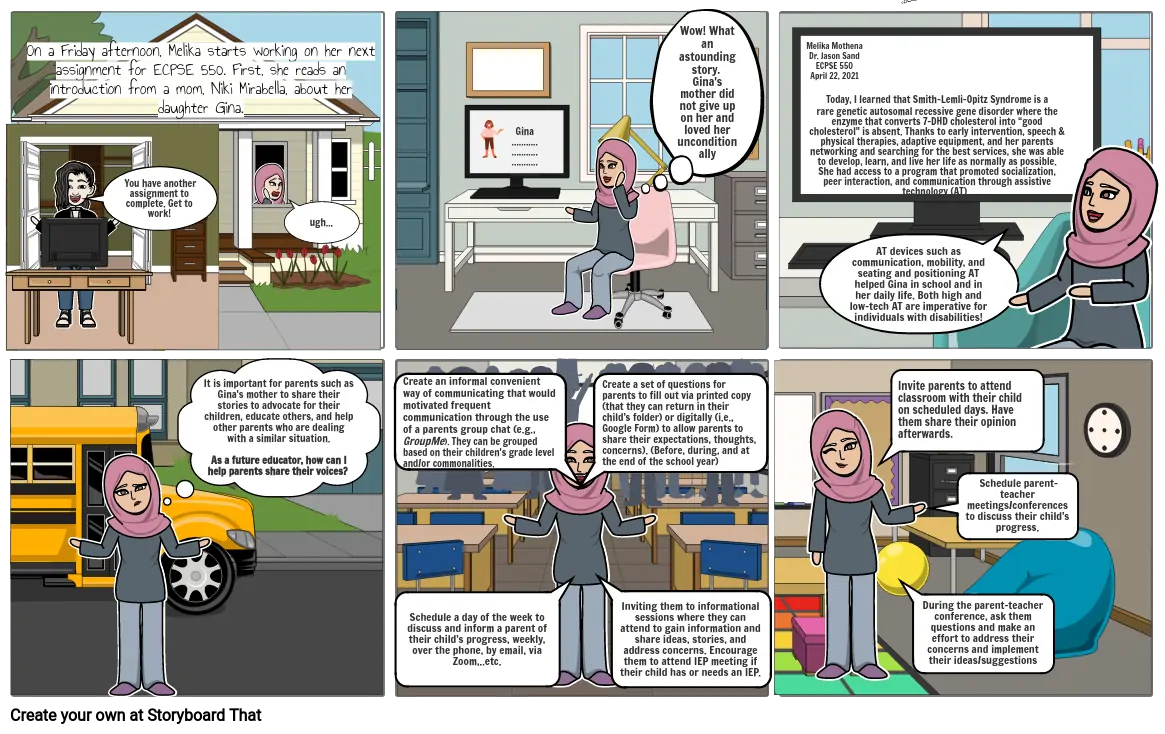Reflection & Thoughts

Описание на Статията
This storyboard reflects how reading and learning about Gina's story impacted me and indicates my thoughts about how, as a future educator, I can help parents share their voices. Enjoy:)
Текст на Статията
- On a Friday afternoon, Melika starts working on her next assignment for ECPSE 550. First, she reads an introduction from a mom, Niki Mirabella, about her daughter Gina.
- You have another assignment to complete. Get to work!
- ugh...
- Gina.............................................
- Wow! What an astounding story. Gina's mother did not give up on her and loved her unconditionally
- Melika MothenaDr. Jason SandECPSE 550April 22, 2021
- Today, I learned that Smith-Lemli-Opitz Syndrome is a rare genetic autosomal recessive gene disorder where the enzyme that converts 7-DHD cholesterol into “good cholesterol" is absent. Thanks to early intervention, speech & physical therapies, adaptive equipment, and her parents networking and searching for the best services, she was able to develop, learn, and live her life as normally as possible. She had access to a program that promoted socialization, peer interaction, and communication through assistive technology (AT).
- AT devices such as communication, mobility, and seating and positioning AT helped Gina in school and in her daily life. Both high and low-tech AT are imperative for individuals with disabilities!
-
- It is important for parents such as Gina's mother to share their stories to advocate for their children, educate others, and help other parents who are dealing with a similar situation. As a future educator, how can I help parents share their voices?
- Create an informal convenient way of communicating that would motivated frequent communication through the use of a parents group chat (e.g., GroupMe). They can be grouped based on their children's grade level and/or commonalities.
- Schedule a day of the week to discuss and inform a parent of their child’s progress, weekly, over the phone, by email, via Zoom,..etc.
- Create a set of questions for parents to fill out via printed copy (that they can return in their child’s folder) or digitally (i.e., Google Form) to allow parents to share their expectations, thoughts, concerns). (Before, during, and at the end of the school year)
- Inviting them to informational sessions where they can attend to gain information and share ideas, stories, and address concerns. Encourage them to attend IEP meeting if their child has or needs an IEP.
- Invite parents to attend classroom with their child on scheduled days. Have them share their opinion afterwards.
- During the parent-teacher conference, ask them questions and make an effort to address their concerns and implement their ideas/suggestions
- Schedule parent-teacher meetings/conferences to discuss their child’s progress.
Над 30 милиона създадени разкадровки

